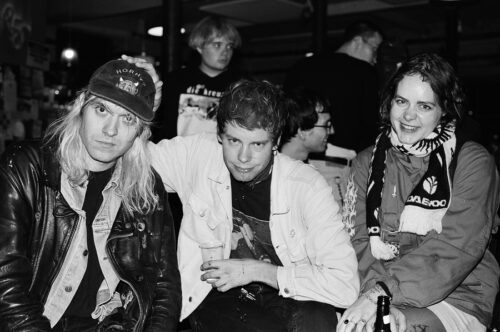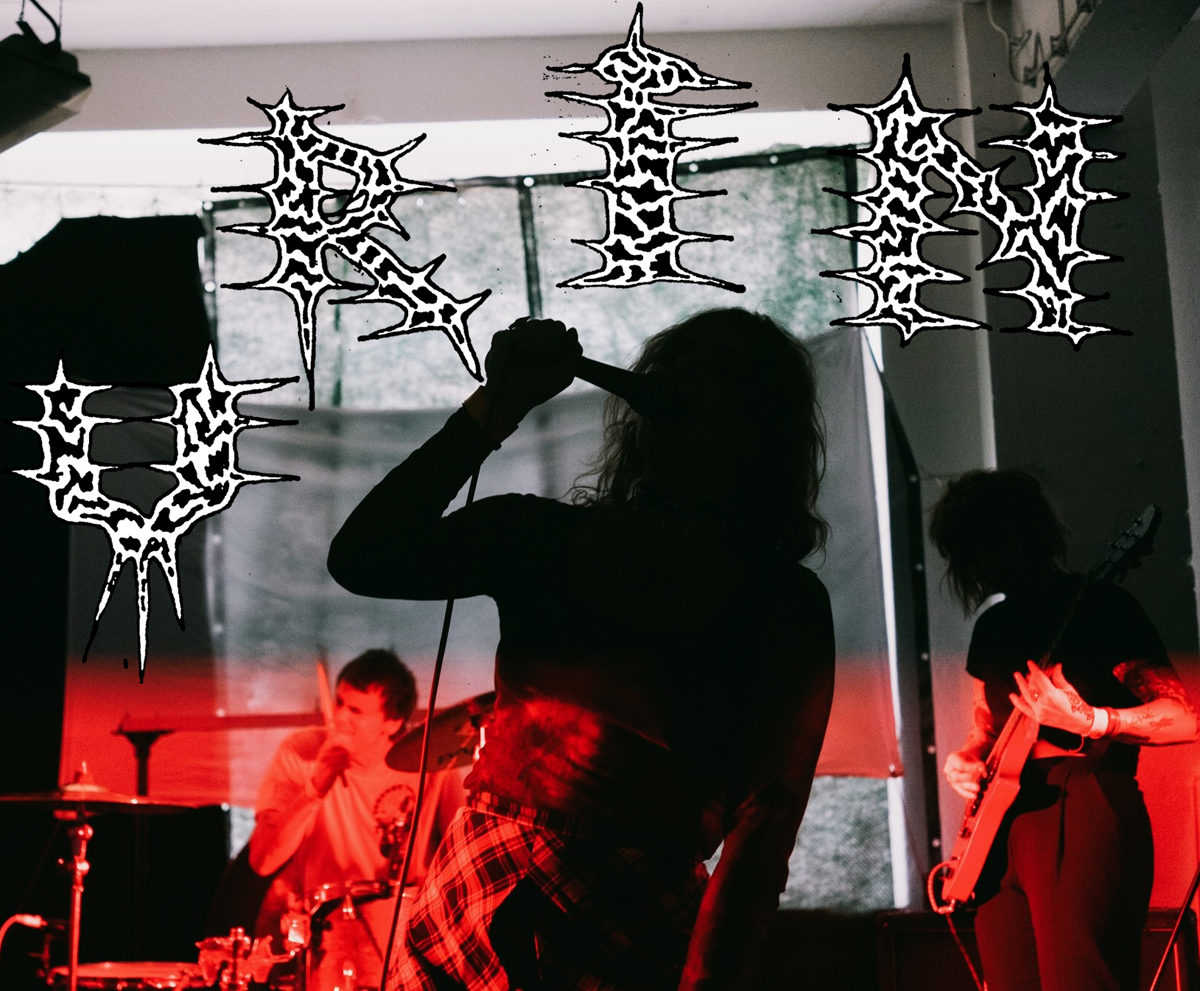
Urin Interview
Urin is a fairly new group based in Berlin with members of numerous ex-bands and current projects, who arrived to the city from Poland, Sweden and the United States. This source-rich density is true to their music too, as it draws from everything far and beyond radikal music, with the aim to play short, angry and super noisy hardcore songs.
Their chaotic, high energy live shows present an unintended thus flippant experiment to widen the soundscape of hardcore that results in effortlessly played sick riffs accompanied by the comic scene of power tools that supposed to be used for guitar torturing falling out of the pocket of the members. Up to this date, their discography only consists a demo tape and 7″ EP but even in this tiny archive I can find a rare spark that makes them remarkable.
This interview was made via email in which Karolina answered our questions. Top photo by Jan KuÄa.
MRR: How did you form? What was the basic idea for this band?
I guess it was fairly simple. I met Per for the first time in a bar on the first day of 2017, probably around 6:00 am. I came to Berlin from Warsaw for NYE, Orden Mundial had played a basement show the night before. We became friends that morning and kept in touch. During one of the endless nights of K-Town we decided to start a band together when I moved to Berlin, which happened a few months later. Per plays drums, I do vocals, David joined on bass. Guitar was a bit of a problem… We didn’t know who to ask. First our friend Adam was with us for a few months but his heart was elsewhere and he quit. Corey had just moved to Berlin around that time — we knew she was an amazing drummer but had no idea about her guitar skills. Anyway, we asked if she’d be down to join and luckily she said yes. So this is Urin.
MRR: What is Urin to you personally?
I love Urin. I love playing shows, it’s also nice to put work into rehearsing. I really appreciate it as an outlet that allows me to forget that everything else around me is collapsing. This summer has been a pretty dark one and it’s been great to have the band as a positive force and something to be excited about. We’re going to tour Colombia and the East Coast of the U.S. this winter and I never even dared to hope something like this would be possible. I also feel lucky that the dynamics between us are super healthy. Even though we spend so much time together there’s never any serious drama and it’s nice to know we can count on each other as friends.
MRR: What is the sonic approach to your songwriting? Not meaning “who brings the riffs and how do you craft your songs” but rather, what do you want to express musically when you make your songs?
I’d say we try to keep it as messy and noisy as possible while still retaining a tight structure. Attempting to be somewhat original while playing D-beat. The plan now is to incorporate more noise elements, hopefully we can work it out. I really value intensity in music. I love this review of our EP: “As Gauze once told us, there’s playing fast and there’s giving the listener the experience of speed.” That could be an accurate description of what we want to express musically.
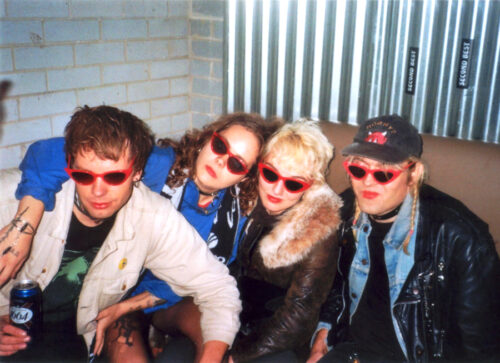
MRR: Have you influenced each other via being in a band together?
After the UK tour our language has certainly developed into quite a peculiar direction… “Top ov thee morning to ya, governor.” We even felt compelled to add some stupid secret messages etched into our 7-inches in the spirit of the governor himself. Another thing would be being hooked on this album Rain Forest by Walter Wanderley. When we’re on tour we have to listen to it at least once a day and it has entered my daily routine as a result. I also listen to it at home a lot.
MRR: How is it to sing in Polish, while being based in Berlin and intended to tour all around? Does it have an influence on your music? Is it lonely, liberating, both, other?
To me the way Polish sounds just fits really well into hardcore music, it’s a strong language. I don’t think it would be possible to understand my lyrics even if I used English, as everything is pretty distorted. I see what is communicated with words as secondary to what is communicated sonically so I don’t really worry about not being understood. Listening to records I only feel inclined to investigate the lyrics a bit closer if I love the music.
I guess singing in Polish is liberating as what I sing about is often quite personal and I’m not the most open person, so it acts a bit as a protective layer. At the same time I try to be thoughtful with the lyrics and I find it challenging to use Polish. Somehow it often feels more pretentious to tell the same stories in my native language than it would in English. I’m not a poet… Or maybe I want to be a poet… Maybe using Polish motivates me to try to craft them better than I’m able to in English. We printed the lyrics in the demo inserts so I’m not really trying to hide anything. Although most people can’t understand them, I still feel like I’m exposing myself a bit.
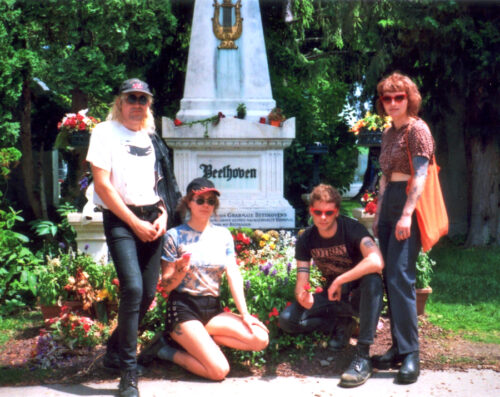
MRR: What brings satisfaction to you when performing your songs live?
It’s such a massive difference when I can see that people are enjoying the show, when there’s some energy in the crowd. I feed off that. Sometimes we hear nice words after a gig that was totally static and I’m surprised because I tend to feel that if there’s no movement people don’t like it. As a performer I definitely prefer an active audience. Then another amazing thing is being approached by girls after a gig, when they say it was inspiring to see a woman on stage, I think that’s very important. Or young kids saying the same thing. Hopefully they start their own bands.
MRR: How do you relate to your own records? It used to be that records served a purpose such as being the object a band markets or being the object that promotes a band to make them able to tour. What is a record to you?
It’s a relief to have a release ready, usually it takes a really long time from the moment you start working on the songs until you can have it in your hands. It feels like some kinda chapter closing, then it’s easier to focus on writing new material and move on. I usually also have a pretty specific idea about how I want the record to look. It’s a lot of work to produce something so I think it’s important that it’s interesting as an object; it’s not just the songs on it but the whole package.
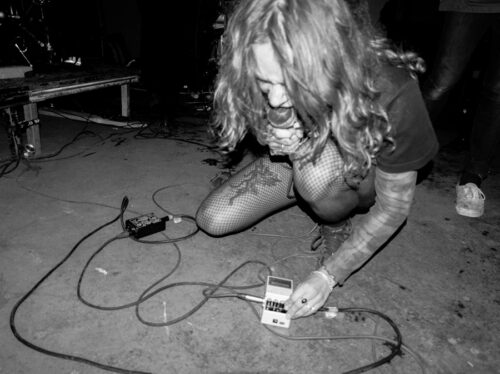
MRR: How does the punk community where you are from differ from Berlin’s?
I got bored with Warsaw so I moved to Berlin. Of course there are some good bands, but people doing interesting stuff are scarce. The electronic music scene is definitely more vibrant and forward-thinking than the punk scene.
I think the reality of living in Poland is way more challenging. As a musician you usually work a shitty job as you value flexibility and your time more than you value money. My first job in Warsaw paid less than €2 an hour. I think now the minimum wage is around €3 an hour. It’s really difficult to afford instruments. My friends who make music there would end up not buying an amp for years. Somehow you figure it out.
I think maybe it could also be considered a good thing — it really filters out people and you know the ones making music are super committed and do it because they have to. I know quite a few people there who are real freaks and see music as everything. It’s nice to have this small tight community, but it can get pretty claustrophobic.
MRR: We destroy the world for comfort and profit. Do you see such self-exterminating processes in punk due to personal interests or laziness?
Sometimes I feel like any efforts to act against the system that fuels the apocalypse are futile. I’m not sure how much I can do to change the situation when the forests in the Amazon and Siberia are burning. We’ll probably be absolutely fucked in a few decades unless a revolution happens. Anyway, I try to take the small steps available and I know I could be better at this.
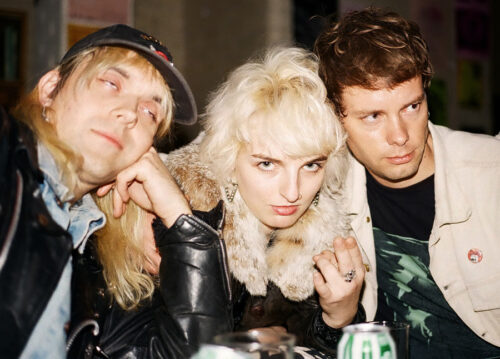
MRR: Punk welcomes and praises mistakes. Have you made any beautiful mistakes with Urin? How much do you seek or tolerate mistakes in your music and art?
I can be a bit obsessive about details but can also accept imperfections. We most certainly welcome mistakes. I’d say there’s a mistake embedded in nearly everything we do. First thing that comes to my mind is the last screen we had made for printing shirts. It turned out it was not prepared correctly so we had to build this intricate frame from board and tape to be able to use it reversed. A beautiful mess. We always print the shirts ourselves so if you got one of them chances are high the print is not actually centered. Sorry!
Another example could be manufacturing our EP. We asked the label if we could take care of printing the covers ourselves to have it done on a risograph, which meant we had to later assemble them ourselves as well. Turned out the covers didn’t really fit the sleeves so we had to cut 500 copies manually… A mistake that could have easily been avoided but so it goes. I think this list could be endless. We’re pretty messy.
MRR This will go onto the internet, will no longer be printed out. Probably more people will read it, yet it can feel different than when it was pressed on paper. Some could even say it is less significant, since no trees are cut for it, no ink is smeared on paper, no big printers were making noise to press this on pages. When I asked a person who has a label whether he would continue buying and releasing records if he was blind he replied with no. Probably because the same data is still available in an accessible form. How do you relate to the new world, where all information is in a cloud and the things some love to have have become space-consuming relics?
I spend hours on the internet every day. I have to because of work, but not only… As much as I appreciate the new technologies, I don’t think the dependency is healthy. The less time I spend in front of a computer, the better I feel, it’s a simple correlation. I wouldn’t agree that objects have become space-consuming relics. Listening to an actual tape/record or reading a book is a different experience than checking something out online.
URIN is about to set off on tour with Olympia noise-punks PHYSIQUE. Dates below.
December 6: Berlin, Kastanienkeller
December 7: Copenhagen, Ungdomshuset
December 8: Malmö, 26an
December 9: Hamburg, Gängeviertel
December 10: Leipzig, Zoro
December 11: Bremen, Sielwallhaus
